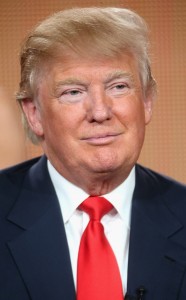
Support for Republican presidential front-runner Donald Trump among his party’s church-going Catholics has risen since Pope Francis suggested the U.S. businessman was not a real Christian, a Reuters/Ipsos poll shows.
Trump has averaged support among 47.9 percent of Catholic Republicans in the 50 days since the leader of the world’s 1.2 billion Roman Catholics made the comment on Feb. 18, up from 39.8 percent in the 50 days that preceded it.
Their brief tiff is one of a series of controversies that have failed to dent the New York billionaire’s popularity, including his call for a temporary ban on Muslims entering the country, his insults to women, and his plans to wall off Mexico if elected president on Nov. 8.
The Reuters/Ipsos poll of 1,117 church-going Catholic Republicans had a credibility interval of 4.8 percentage points.
Asked about plans for a wall on the border with Mexico, the pope said in February: “A person who thinks only about building walls, wherever they may be, and not building bridges, is not Christian.”
A papal spokesman later said the pontiff was “in no way” singling out Trump or trying to sway voters. The blunt candidate, after initially saying it was “disgraceful” for the pope to judge another’s faith in God, said Francis was “a nice man” who was probably misinterpreted by the media.
Catholics are a sizable U.S. voting bloc, comprising about a quarter of the electorate, says Georgetown University’s Center for Applied Research in the Apostolate. Catholics nearly evenly split their presidential votes between Republicans and Democrats, according to a Pew Research Center analysis.
‘NOT A DIRECTIVE’
Part of the increase in Trump’s support among Catholics is likely related to the dwindling number of Republican White House candidates, a field that has dropped from 12 in January to three – the Presbyterian Trump, U.S. Senator Ted Cruz of Texas, a Southern Baptist, and Ohio Governor John Kasich, an Anglican.
But Mark Gray, a senior research associate at Georgetown, said the results also showed that Catholics who heard the pope’s message about Trump were not swayed.
“Many Catholics probably felt that the pope’s comments were not a directive on how they should vote or who they should support, and still others may never have been aware of the pope’s comments to begin with,” he said.
While opinion polls have shown few U.S. Catholics think it necessary to agree with the pope on every issue to be a faithful Church member, a Washington Post-ABC poll last September showed the pope had an 86 percent favorability rating.
Father William Paul McKane, a Catholic priest in rural Montana who supports Trump, said he felt the pope’s comments had backfired with his flock.
“I call it paradoxical, to put it gently, that the pope said that, when he lives behind walls that are about 40 feet high and 40 feet across,” he said, referring to the walls around Vatican City. “That comment hurt his credibility with my parishioners.”
McKane said he appreciates Trump’s speaking plainly about issues like security and the economy – issues he said were in line with Christian values of protecting the innocent – even if he dislikes some of the candidate’s more fiery comments.
“Trump’s verbiage does not sound compassionate,” McKane said. “I don’t hold him up as a paragon of Christian virtue, but I’m not looking for that in a candidate. I’m looking for someone who is prudent and can make good political decisions.”
CLERGY FAVOR CRUZ
While support for Trump among ordinary Catholic Republicans is high – roughly equal to that among Republicans as a whole – the small sums of money flowing to the candidates from Christian priests, bishops, pastors and other clergy of all denominations tend to favor the evangelical Cruz.
Cruz received $155,500 in contributions from about 380 members of the Christian clergy who each gave above the $200 reporting threshold through February, compared with about $700 from 10 people for Trump and $3,500 from nine people for Kasich.
McKane is the only contributor listed in Trump’s campaign finance disclosures who identified himself as a Catholic priest, based on a Reuters review.
On the Democratic side, U.S. Senator Bernie Sanders of Vermont – the only Jewish candidate – has received some $85,400 from about 280 people ordained for religious duty in the church, compared with about $192,500 from about 250 individuals for former Secretary of State Hillary Clinton.
Clinton polls much better among church-going Catholic Democrats, with 67.8 percent support, compared to Sanders’ 29.3 percent, according to Reuters/Ipsos polling, despite Sanders’ bid to liken his view to the pope’s, especially on wealth inequality and climate change.
Sanders and the pope met briefly on Saturday at the Vatican, where Sanders addressed a conference on social justice.
END

Be the first to comment